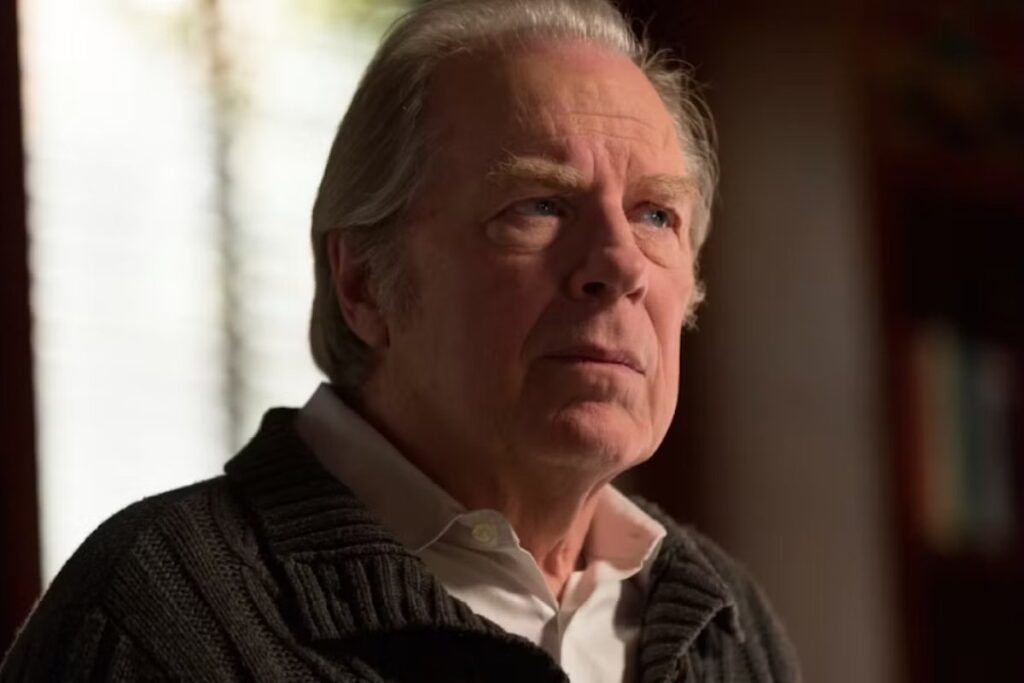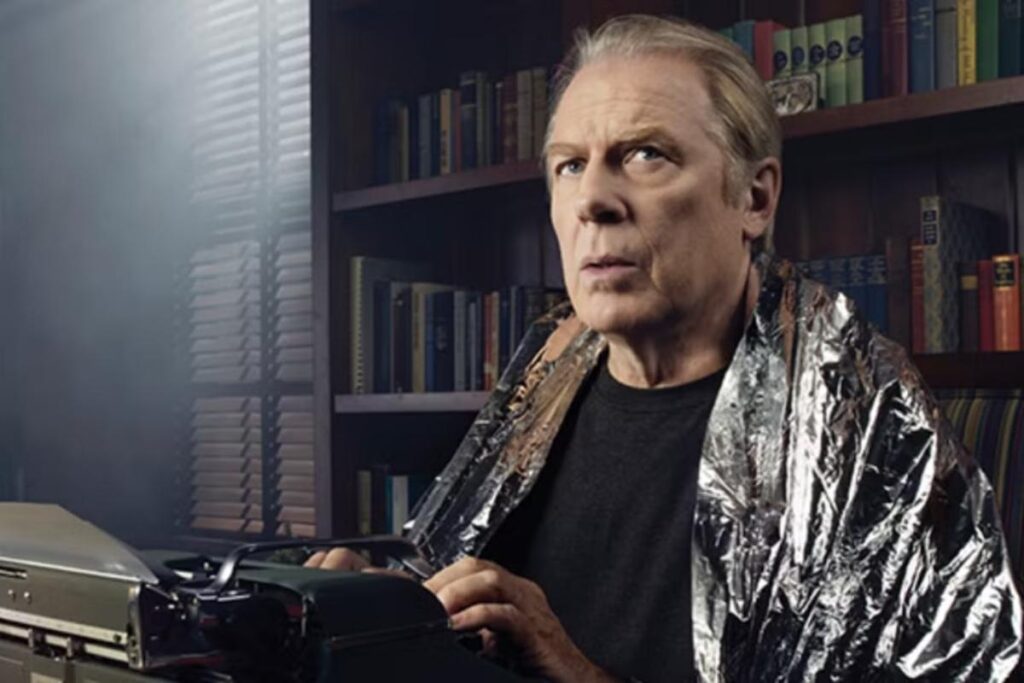
Chuck McGill Biography – From Legal Genius to Tragic Figure
Chuck McGill blazed into history books as Francis Xavier High School’s youngest graduate. At just 14, he earned his valedictorian honors and set off on an incredible legal journey. His academic excellence continued at Georgetown University Law Center, where he graduated magna cum laude. He went on to establish one of the American Southwest’s leading law firms, Hamlin, Hamlin & McGill (HHM). His brilliant legal mind led to a groundbreaking win in State v. Gonzalez when his career was just starting.
His professional achievements stood in stark contrast to his personal battles. Chuck’s life took a dark turn when he developed electromagnetic hypersensitivity. He lived without electricity in his home and struggled through a difficult relationship with his brother Jimmy that ended up playing a role in his tragic fate. This complete biography tells the story of a legal genius whose unwavering devotion to law and inner demons shaped his destiny. These same forces revolutionized his brother’s path toward becoming the notorious Saul Goodman.
Early Life and Path to Law
Chuck McGill was born in 1944 in Cicero, Illinois, as the eldest son of Ruth and Charles McGill Sr. His younger brother Jimmy received more attention from their parents, which created relationship dynamics that lasted throughout their lives.
Childhood in Cicero
Chuck McGill’s future path started taking shape in the Chicago suburb of Cicero. He grew up in a middle-class family and managed to keep good ties with his parents. The family went through tough times when their business struggled financially. Chuck helped out by managing the books during his college holiday breaks.
Academic excellence
Chuck McGill’s sharp mind became evident early in his college years. He led the University of Pennsylvania’s debate team to win national championships three years in a row. On top of that, it earned him the prestigious Larkin Prize as an undergraduate.
Georgetown University Law Center saw more of his brilliance. Chuck McGill stood out among his classmates as the Law Review’s Editor-in-Chief. He won the first-year Moot Court competition, which proved his natural talent for legal debates. His time at Georgetown ended up with a magna cum laude graduation.
Getting magna cum laude instead of summa cum laude was still an amazing feat. Georgetown’s ranking system made things tricky – even one B grade in a five-hour class could change everything. Yet Chuck’s grades set him up for an outstanding legal career.
First legal victories
Chuck McGill’s career took off right after graduation. He landed prestigious clerkships at the Delaware Court of Chancery and the United States Court of Appeals for the Tenth Circuit. These roles gave him valuable experience and connections in the legal world.
His big break came when he joined George Hamlin’s solo practice in Albuquerque, New Mexico. This choice reshaped the southwestern legal scene. Over the next 23 years, Chuck worked with George Hamlin and later Howard Hamlin to turn their small firm into one of the region’s legal powerhouses.
Criminal law became Chuck McGill’s specialty early on. He argued and won the groundbreaking case State v. Gonzalez, which made him a force to reckon with in court. This case not only showed his legal expertise but also helped shape New Mexico’s laws.
Chuck didn’t just focus on his own success. He helped others grow too, especially Howard Hamlin, whom he coached for the bar exam. His dedication to building both his career and supporting others showed what a well-rounded professional he was.

Building the HHM Empire
Chuck McGill and George Hamlin started a modest two-room legal practice that grew into one of the Southwest’s most prestigious law firms in the 1970s. Their partnership became the foundation of Hamlin, Hamlin & McGill (HHM), which would revolutionize Albuquerque’s legal world for decades.
Partnership with Howard Hamlin
HHM’s progress reached a new phase when George’s son, Howard Hamlin, joined the firm. Chuck McGill played a key role in Howard’s career and personally helped him prepare for the bar examination. Howard dreamed of starting his own practice, but his father convinced him to join HHM in 1985.
Chuck McGill and Howard Hamlin shared a complex mentor-protégé bond. Chuck’s opinions shaped many strategic decisions because of his position as a founding partner with substantial equity. His stellar reputation drew many high-profile clients to HHM, making him vital to the firm’s success.
The trio built one of the largest law firms in the Southwestern United States over twenty-three years. Chuck’s business sense proved invaluable. The firm expanded from a small two-room office into a legal powerhouse under his guidance.
Notable cases and precedents
Chuck McGill’s legal expertise shone through several groundbreaking cases during his time at HHM. His early work in criminal law reached its peak with State v. Gonzalez, where his arguments created vital legal precedents. This win established him as one of Albuquerque’s top attorneys.
The firm handled several landmark cases that boosted its prominence:
- The Sandpiper Crossing class action lawsuit, which exposed systematic overcharging of elderly residents
- Mesa Verde Bank and Trust’s expansion initiatives, which highlighted the firm’s banking law expertise
- Multiple precedent-setting cases that shaped New Mexico’s legal framework
Chuck’s steadfast dedication to HHM’s prestigious status led to some controversial decisions. The Mesa Verde case showed both his legal brilliance and complex personality. His precise attention to detail and commitment to legal accuracy became HHM’s trademark.
Chuck McGill’s unique blend of legal expertise and business acumen drove the firm’s success. Howard excelled at client relations and management, while Chuck’s brilliant legal mind enhanced the firm’s reputation. Each leader focused on their strengths, which helped HHM reach new heights in the Southwestern legal community.
Chuck’s name alone brought substantial business to HHM. His status as one of Albuquerque’s most respected lawyers carried weight with potential clients. The firm maintained its market position and client relationships thanks to Chuck’s continued association.
HHM’s achievements under Chuck McGill went beyond professional success. His vision of legal excellence and dedication to high standards shaped the firm. Chuck McGill built a lasting legal institution through mutually beneficial alliances, groundbreaking cases, and mentorship of young lawyers. His influence on Southwestern law continues today.
Chuck McGill’s Legal Philosophy
Chuck McGill built his remarkable career on a steadfast dedication to legal principles. These shaped how he approached justice, mentoring, and New Mexico’s legal scene. His deep belief in the law’s sanctity became his greatest strength and ended up creating personal conflicts.
Views on justice
Chuck McGill’s point of view on justice had one basic principle: “Let justice be done, though the heavens fall”. He saw the law as society’s unchangeable foundation rather than a flexible tool. His strict interpretation of legal procedures came from his belief that law showed absolute truth and justice.
During his time at HHM, Chuck showed an absolute commitment to ethical standards. In spite of that, his approach had its complexities. This became clear in high-profile cases where winning became more important than finding the whole truth. His legal philosophy showed in his careful attention to detail and his drive for perfect procedures.
Mentoring approach
Chuck McGill’s role as a mentor had two distinct sides. Howard Hamlin’s success proved Chuck’s skill at developing legal talent. He guided Howard through the bar exam and helped him grow into a respected attorney. But his mentoring came with strict rules – he just needed complete loyalty to traditional legal practices and professional standards.
His relationship with his brother Jimmy stood out most. He gave Jimmy his first chance with a position in HHM’s mailroom. Chuck’s reaction to Jimmy’s legal dreams showed what he truly believed about who should practice law. His famous words, “Slippin’ Jimmy with a law degree is like a chimp with a machine gun”, showed his fear that some people might damage the legal profession’s integrity.
Chuck’s mentoring style focused on:
- Strict adherence to legal protocols
- Steadfast dedication to ethical standards
- Careful attention to procedural details
- Zero tolerance for shortcuts or manipulation of rules
Impact on New Mexico law
Chuck McGill left a lasting mark on New Mexico’s legal world. His early win in State v. Gonzalez created important measures that still shape state law today. His expertise in criminal law helped create legal precedents that affected countless later cases.
Chuck’s drive for high professional standards at HHM made the firm the life-blood of Albuquerque’s legal community. His way of practicing law, with deep research and exact arguments, raised the bar for legal excellence across the region.
His influence went beyond individual cases. As HHM’s founding partner, he helped reshape the scene into one of the Southwest’s top legal firms. His drive to protect the law’s sanctity shaped many attorneys who worked at HHM.
Chuck’s belief in absolute law sometimes stymied his ability to adapt. His strict following of rules sometimes made him miss the human side of justice. This showed clearly in how he treated people he thought weren’t worthy of being lawyers.
Yet Chuck McGill’s effect on New Mexico’s legal system stands clear. He raised professional standards and shaped legal precedents that altered the state’s judicial map. Even after he left, his influence lived on through the institutions he built. The Chuck McGill Law Library stands as proof of his lasting impact.
The Space Blanket Years
Chuck McGill’s life took a dramatic turn when he started experiencing what he believed to be electromagnetic hypersensitivity (EHS). This forced him to step away from his duties at HHM. His condition emerged right after his divorce from Rebecca Bois and marked the start of a tough chapter in his distinguished career.
Onset of electromagnetic sensitivity
Chuck McGill showed severe physical reactions to electromagnetic fields. He created an electricity-free environment in his home. Studies at the time showed about 4% of people reported unpleasant symptoms from exposure to electromagnetic fields. Chuck disconnected all electrical devices and used gas lamps for light instead.
His adaptation to this condition required strict rules for visitors who had to:
- Place all electronic devices in the mailbox
- Ground themselves to remove static charge
- Comply with his electricity-free environment requirements
Working from home
Chuck managed to keep his legal practice running from his house under extraordinary circumstances. His workspace became a carefully controlled environment with Chuck McGill space blankets – metallic sheets that reflected electromagnetic radiation. Michael McKean’s portrayal of these challenging circumstances earned high praise, and critics called his performance one of TV’s best in 2017.
Chuck’s drive to practice law despite his condition showed remarkable resilience. Most people with severe EHS withdrew from modern society entirely, but he found ways to adapt. His home office became proof of his steadfast dedication to legal practice, though his condition changed his working methods by a lot.
Effect on legal practice
The space blanket years deeply changed Chuck McGill’s professional world. He needed special accommodations and wore specially designed suits with space blanket linings during HHM meetings. His legal skills stayed sharp, as shown by his work on major cases from a distance.
The World Health Organization suggested that people with EHS claims should get a full medical and psychological evaluation. Chuck’s symptoms seemed worst during stressful times, especially when he handled complex legal matters.
His condition affected more than just his personal practice – it touched the entire firm. Howard Hamlin supported and enabled Chuck’s condition at first but started questioning his stability over time. This change in viewpoint led to big shifts in firm dynamics and leadership.
The space blanket years showed how personal struggles and professional dedication could intertwine. Chuck’s home became both his safe haven and prison. Space blankets surrounded him as visible reminders of his isolation. Yet he kept his reputation as a brilliant legal mind and helped HHM succeed despite his self-imposed limits.

Complex Family Dynamics
The relationship between the McGill brothers remains one of the most fascinating parts of Chuck McGill’s story. Their complicated bond shaped by childhood memories and professional rivalry ended up defining both their lives.
Relationship with Jimmy
Chuck McGill’s connection with his younger brother Jimmy changed from being a supportive mentor to becoming a bitter rival. Chuck helped Jimmy get a job in HHM’s mailroom but made him promise to stop his con artist ways. Jimmy looked up to his brother so much that he secretly finished college and passed the bar exam.
Their problems ran much deeper than work differences. Chuck resented how Jimmy could charm people and win their love so easily. This jealousy came from seeing their parents favor Jimmy, leaving a wound that never healed.
Things got worse at work as Chuck saw Jimmy’s approach to law as dangerous. He famously said “Slippin’ Jimmy with a law degree” was like “a chimp with a machine gun,” showing how much he looked down on his brother. Chuck showed his disapproval by making sure Jimmy never got hired at HHM.
The Mesa Verde case broke them apart completely. Chuck’s electromagnetic sensitivity got worse after meeting Mesa Verde’s president. He knew Jimmy had something to do with it. Chuck recorded Jimmy’s confession and used it against him at a bar hearing.
Mother’s final moments
The brothers’ complicated relationship showed clearly during their mother Ruth McGill’s last hours. They stayed by her hospital bed for three days in 1992. Jimmy tried to lift the mood and went to get sandwiches. He knew exactly what his brother would want without asking.
Something happened that would change everything while Jimmy was gone. Ruth woke up briefly and called out “Jimmy? Jimmy?” as her last words, even though Chuck sat right there. When Jimmy came back with food, Chuck made a choice that showed how broken their relationship was – he lied and said their mother never spoke before dying.
This moment brought out all their old problems. Chuck kept their mother’s last words secret because of jealousy that went back to childhood. The whole thing showed their relationship perfectly – Chuck feeling second-best despite everything he had achieved.
Their last meeting turned out just as badly. When Jimmy tried to fix things, Chuck hurt him deeply by saying Jimmy never mattered to him. This rejection and Chuck’s tragic death later pushed Jimmy to become Saul Goodman.
Chuck McGill’s family relationships, especially with Jimmy, paint a picture of someone caught between doing what’s right and fighting his personal demons. He never managed to settle these conflicts, which led to his downfall and changed both brothers’ legal careers forever.
Final Days at Chuck McGill House
Chuck McGill’s life ended in a series of heartbreaking events at his home. This brilliant legal mind who once stood before the Supreme Court couldn’t cope after being pushed into retirement. His mental crisis got worse and worse until it led to his tragic end.
Mental decline
Chuck McGill’s mental state took a severe downturn after Howard Hamlin handed him a USD 3.00 million check – his first buyout payment from HHM. Michael McKean brilliantly portrayed how this unexpected event broke Chuck’s spirit. His therapy sessions with Dr. Cruz showed promise at first. He made enough progress that he could work under overhead lights and use electrical appliances.
The progress didn’t last long. A heated argument with Jimmy sent Chuck into a downward spiral. He became obsessed with finding hidden electrical sources and tore his house apart. Step by step, he:
- Removed all appliances
- Tore down walls to eliminate wiring
- Smashed his electric meter in a fit of rage
Last cases
Chuck showed amazing resilience before his breakdown. He handled legal work from his space blanket-lined sanctuary. Mesa Verde Bank’s expansion became his final professional project. His legal mind stayed sharp even as his personal life fell apart, but his need for perfection became his undoing.
The story’s darkest chapter came five days after his fight with Jimmy. Chuck sat in his torn-apart house during his final moments. He kicked his desk several times until a gas lantern fell onto scattered papers. This act, done in a disturbed and tormented state, marked the end of a brilliant but troubled life.
Chuck’s final days showed how deeply isolation affected his mind. His family had gone, and the firm no longer felt like home. Dr. Cruz became his only regular contact. His pride stopped him from asking for help when he needed it most. His last words to Jimmy were cruel – saying his brother never really mattered to him. These words would haunt both their memories forever.
Chuck McGill’s final chapter teaches us about mental health’s complexity. His fierce pride and worsening condition mixed with his refusal to accept help created the perfect storm. His story reminds us that even the brightest minds can lose their way when they don’t have support.
Chuck McGill Frequently Asked Questions
What is wrong with Chuck McGill?
Chuck McGill suffers from a debilitating condition called electromagnetic hypersensitivity (EHS), which causes him to experience severe physical reactions to electrical devices. However, his symptoms are psychosomatic, stemming from deep-seated mental health struggles.
How did Chuck McGill die?
Chuck McGill died by suicide after deliberately setting his house on fire while inside. His declining mental state and career downfall led him to this tragic decision, as he felt isolated and powerless over his circumstances.
Why did Chuck McGill kill himself?
After being forced out of his legal career and feeling betrayed by his brother, Chuck McGill fell into a deep depression. Believing he had no future, he ended his life in despair, unable to cope with the loss of his identity and purpose.
What mental illness does Chuck McGill have?
Chuck McGill likely suffers from a combination of depression and a delusional disorder related to his belief in electromagnetic hypersensitivity. His paranoia and obsessive behavior suggest deeper psychological issues.
What was Chuck McGill’s most significant legal achievement?
Chuck McGill’s most notable legal accomplishment was his precedent-setting victory in the State v. Gonzalez case early in his career. This landmark case showcased his legal acumen and contributed significantly to New Mexico’s legal framework.
What was the nature of Chuck McGill’s relationship with his brother Jimmy?
Chuck and Jimmy had a complex and tumultuous relationship. While Chuck initially supported Jimmy by offering him a position in HHM’s mailroom, their relationship deteriorated over time due to Chuck’s disapproval of Jimmy’s approach to law and his belief that Jimmy would never truly change his ways.
How did Chuck McGill contribute to the growth of Hamlin, Hamlin & McGill (HHM)?
As a founding partner, Chuck played a crucial role in transforming HHM into one of the largest and most prestigious law firms in the Southwestern United States, using his legal expertise and business acumen to attract high-profile clients and build its reputation for excellence.
What is the Chuck McGill meme?
The Chuck McGill meme originates from Better Call Saul, often featuring his intense expressions, dramatic moments, or his condition, electromagnetic hypersensitivity (EHS), used humorously online. Fans frequently remix his quotes and scenes into exaggerated or ironic meme formats.
What other roles has the Chuck McGill actor, Michael McKean, played?
Michael McKean is known for roles in This Is Spinal Tap, Laverne & Shirley, Clue, and A Mighty Wind. His diverse career spans comedy, drama, and music, showcasing his versatility across film, television, and theater.

